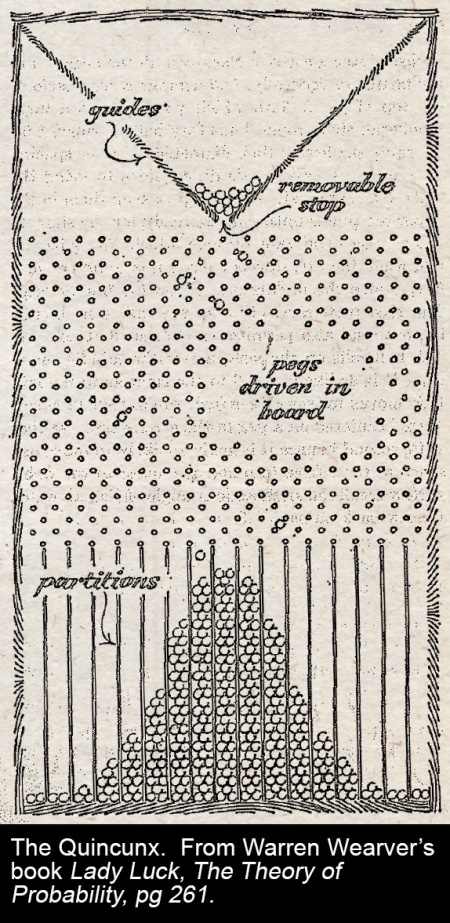Correlation: Difference between revisions
Jump to navigation
Jump to search
Amwelladmin (talk | contribs) No edit summary |
Amwelladmin (talk | contribs) No edit summary |
||
| Line 1: | Line 1: | ||
{{a|glossary|}}The idea, first articulated by statistician Karl Pearson<ref>So [https://slate.com/technology/2012/10/correlation-does-not-imply-causation-how-the-internet-fell-in-love-with-a-stats-class-cliche.html Slate Magazine argues, at any rate.</ref>, that a relationship between two variables could be characterised according to its strength and expressed in numbers. | {{a|glossary| | ||
[[File:Quincunx.jpg|450px|thumb|center|A [[quincunx]], yesterday]] | |||
}}The idea, following from Sir Francis Galton’s experiments with a [[quincunx]] and first articulated by statistician Karl Pearson<ref>So [https://slate.com/technology/2012/10/correlation-does-not-imply-causation-how-the-internet-fell-in-love-with-a-stats-class-cliche.html Slate Magazine argues, at any rate.</ref>, that a relationship between two variables could be characterised according to its strength and expressed in numbers. | |||
===Correlation and causation=== | ===Correlation and causation=== | ||
Revision as of 10:25, 23 September 2019

|
The idea, following from Sir Francis Galton’s experiments with a quincunx and first articulated by statistician Karl Pearson[1], that a relationship between two variables could be characterised according to its strength and expressed in numbers.
Correlation and causation
Now it is true that correlation doesn’t imply causation, but it doesn’t rule it out either. And it is certainly true that a lack of correlation does imply a lack of causation.
All other things being equal, a correlation is more likely to evidence a causation than a lack of correlation, right? This is one of those logical canards, as Monty Python put it, “universal affirmatives can only be partially converted: all of Alma Cogan is dead, but only some of the class of dead people are Alma Cogan.”
See also
References
- ↑ So [https://slate.com/technology/2012/10/correlation-does-not-imply-causation-how-the-internet-fell-in-love-with-a-stats-class-cliche.html Slate Magazine argues, at any rate.